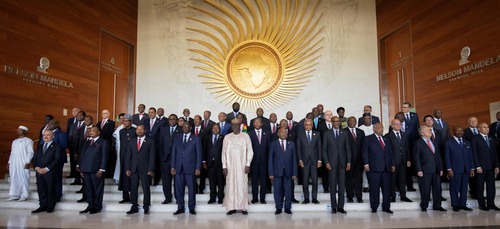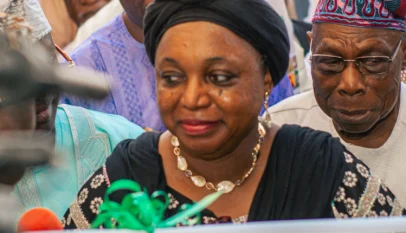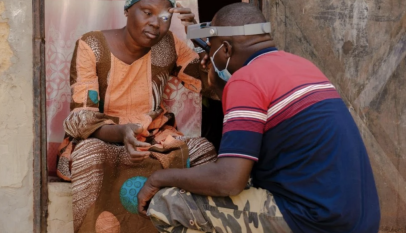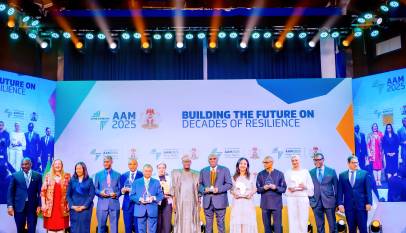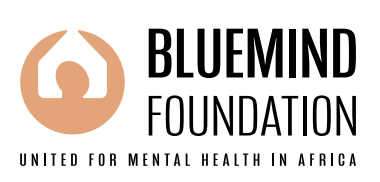AU@60: Appraising Africa’s long-walk towards continental integration
The 36th Ordinary Session of the Assembly of Heads of State and Government of the African Union urged member states to double the spirit of pan-Africanism and intra-African solidarity by accelerating the operationalization of the Africa Continental Free Trade Area (AfCFTA).
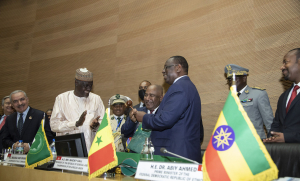
“This is indeed a momentous and historic day for Africa and for all Africans. We stand today on the stage of world affairs before the audience of world opinion. We have come together to assert our role in the direction of world affairs and to discharge our duty to the great continent.” – His Imperial Majesty Haile Selassie I, Emperor of Ethiopia, May 25, 1963.
On Saturday, May 25 1963, heads of state and government of 32 largely newly independent African states gathered in Addis Ababa, Ethiopia to chart a new direction for the yet to be completely decolonized continent. That convening gave birth to the now defunct Organization of African Unity (OAU), an intergovernmental entity aimed at promoting Africa’s liberation, integration and unity based on the ideals of Pan Africanism.
Therefore, the OAU’s primary goals were freeing the continent from the clutches of colonialism, neo-colonialism and apartheid on the one hand, as well as upholding unity and solidarity among African states, deepening socio-economic development cooperation, protecting their sovereignty and territorial integrity, and promoting international cooperation within the framework of the United Nations on the other.
OAU’s early successes were the settlement of disputes between Algeria and Morocco and between Kenya and Somalia in the mid-1960s. Eventually, all African countries attained independence with Namibia becoming Africa’s last colony to gain independence in 1990 while South Africa transitioned from apartheid to majority rule in 1994. In 1993, a mechanism for peacemaking and peacekeeping was introduced by OAU to aid Regional Economic Communities (RECs) to advance democratic governance across the continent.
In 2002, Africa’s quest for integration attained another milestone with the launch of the African Union as a successor to the OAU. Modeled after the European Union, the AU was designed to “promote unity, solidarity, cohesion and cooperation among the peoples of Africa and African States”. Despite its weaknesses, including allegedly being merely “a platform for coordinating the interactions of its 55 member states,” the AU has created significant frameworks in the areas of peace, security, and trade, notably the AfCFTA.
Lack of political will from Member States derailing major AU policies – Faki
In his remarks at the opening of the summit, Chairperson of the African Union Commission Moussa Faki said after six years at the helm of the AU Commission, he had realized the Commission was limited in its capacity to implement the AU’s decisions, noting that while Africa invests a lot of enthusiasm into taking decisions and designing continental policies, little was being done to bring them to life due to a lack of political will by Member States, hence the AU’s failure to realize its potential.
“The phenomenon is aggravated by the dominance of national interests and divisions, which weaken the momentum in Africa’s progress as a unified, integrated, and strong entity speaking with one voice. I will mention a few founding initiatives that are struggling to come to reality due to a lack of political will: the free movement of people and goods, the African Passport, the creation of financial institutions, the Single African Air Transport Market as well as major integrating infrastructure projects,” bemoaned Faki.
The AUC chief said over the past three years African countries had suffered from slowed global economic growth, higher rates of inflation and an energy crisis leading to rising production costs. He therefore called on African countries to, as a response to these economic uncertainties, activate various mechanisms of internal resilience, such as the rapid implementation of African financial institutions, in the spirit of intra-African solidarity.
“The prevailing paradigm whereby we keep our arms folded while the house of our neighbor burns must imperatively change. This paradigm is a form of collective resignation of conscience that has nothing to do with our culture and even less with our civilization, both of which are based on mutual aid. African countries confronted with terrorism provide a shocking example of these realities, fighting often alone and with general indifference. I fully understand those who question themselves bitterly. Where is Pan-Africanism?”
Faki said one of African countries’ major drawbacks was their weak political and security governance systems, leading to the resurgence of unconstitutional changes of government as well as violent extremism and terrorism.
“I would like to clearly pose the question of the sanctions imposed on Member States, following unconstitutional changes of government. Obviously, these sanctions do not seem to produce the expected results. On the contrary, they arouse mistrust in the states concerned and seem to punish the populations more and have a negative impact on the economies of the countries concerned.”
Moreover, the top AU diplomat said the AU remains committed to the implementation of its flagship project on Silencing the Guns in Africa by 2030 through the resolution and mitigation of certain crises on the continent. In this direction, he noted as a key success the Ethiopia-Tigray peace deal as well as progress in similar peace efforts in Libya, Sudan, Somalia and DRC. “My thanks go to President Olusegun Obasanjo and the panel members whose dedication and wisdom were outstanding. South Africa offered hospitality and a conducive environment. Many thanks to her,” concluded Faki.
Ethiopian PM buttresses African solutions to African problems
In his welcome remarks, the Prime Minister of Ethiopia, Abiy Ahmed, reechoed the opening statement of Emperor Haile Selassie of Ethiopia during the first summit of the OAU in May 1963, quoting Selassie’s remarks that whereas disputes among newly independent African countries were inevitable, efforts to resolve such disputes “must be confined to this continent and quarantined from the contamination of non-African interference” in the principle of African solutions to African problems.
“When I stood before you last year on this same occasion, Ethiopia was just coming out of a costly conflict. This time, I am here to celebrate the signing on November 2, 2022, of the Pretoria Peace Accord between the Ethiopian Government and the TPLF, which has led to the silencing of the guns in the northern part of our country. Ethiopia is where it is today in no small part because of the tireless efforts of the African Union and the wisdom of its deeply held belief in the principle of “African solutions to African problems.””
The Ethiopian leader said whereas the principle of African solutions to African problems was widely adopted in conflict situations, it was imperative that the same principle be extended to continental food security and food sovereignty issues so that the continent was not only able to feed itself but could become the world’s breadbasket. Mr Ahmed urged African leaders to critically assess why one-third of the world’s hungry people were in Africa, despite the continent being home to 65% of the world’s uncultivated arable land.
To this end, the Ethiopian PM called for the implementation of the 2023 Dakar Declaration on Food Sovereignty and Resilience, which he said had rightly acknowledged the continental awakening that ‘it is time for Africa to feed itself and fully unlock its agriculture potential to feed the world.’ Mr Ahmed, however, said the principle of African solutions to African problems was not a silver bullet for addressing the continent’s challenges as not all of Africa’s problems were its own making, citing climate change as a case in point.
“We all know that Africa’s contribution to global warming is insignificant. Yet climate change is already affecting Africa more severely than any other part of the world. To this extent, climate change is an African problem, but its roots lie elsewhere. Global meetings on climate change are rich with the rhetoric of climate justice, a just transition, and the common but differentiated responsibilities of parties. These talks, however, are hardly ever backed up with action and Africa cannot wait,” stressed PM Ahmed.
President Sall hands over the baton of AU leadership
One of the highlights of the summit was the handover of the chairmanship of the continental body by President Macky Sall of Senegal to President Azali Assoumani of the Union of Comoros. In his farewell remarks, President Sall said Africa was battling the challenge of terrorism and unconstitutional changes of government and therefore called for the implementation of the commitments of the Extraordinary Malabo Summit on Terrorism and Unconstitutional Changes of Government, including the operationalization of the African Standby Force.
The Senegalese president said the geopolitical reconfiguration of the world offers Africa a historic opportunity to reinvent its cooperation with world powers through co-constructed partnerships that respect African values, culture and civilizations. Sall said whereas not much progress has been made in the campaign for the reform of the UN Security Council during his leadership of the AU, the campaign for Africa’s accession into the G20 was on the right track – with 10 of the 20 G20 countries having expressed their support for Africa’s membership in the block.
“This is the plea that I brought on your behalf to the 6th Europe-Africa Summit in Brussels; the OECD Council in Paris; the G7 Summit at Elmau; TICAD 8 at Tunis; the General Assembly of the United Nations; COP 27 in Sharm El Sheikh; the G20 Summit in Bali; and the 2nd United States-Africa Summit in Washington. At all these platforms, I have reaffirmed that in these times of deep change, working together requires another way of thinking about the world, another way of acting between partners respectful of their common values and their differences,” the outgoing AU chair told the Assembly.
Like the Ethiopian PM, President Sall called on the Union to take urgent steps for the implementation of the recommendations of the 2nd Dakar Summit on Agriculture and Food Security (Dakar 2), aimed at realizing an Africa that will not only feed itself but also feed the world. He said Dakar 2 had seen several countries signing bilateral and multilateral partnerships aimed at stimulating agricultural production, processing and trade worth $36 billion, including $10 billion from the African Development Bank (AfDB).
“At the end of my mandate, I would like to express to you all my gratitude for your trust. Serving our continent has been a privilege and a source of great pride, because I believe in a united Africa, an Africa standing up, an Africa at work, an Africa in peace and confident in its future,” Sall concluded, adding that to realize the dream of the AU’s founding fathers and the aspirations of the African people, African leaders had to always remain at the front of the fight for Africa, as a responsibility conferred by the heritage of Pan-Africanism.
As Comoros assume the leadership of AU
The major highpoint of the AU’s 36th Ordinary Session was the passing of the AU’s leadership baton, with Mr Azali Assoumani, President of the Union of the Comoros, becoming the AU’s substantive chairman. President Assoumani saluted the memory of the founding fathers of the OAU such as Kwame Nkrumah, Sékou Touré and Kenneth Kaunda, adding that although times have changed, the ideals of African integration continue to “inspire our thoughts, our actions and the march of the continent.”
President Assoumani, who committed to building on the successes of President Sall said as African countries were emerging from the devastating impact of the Covid-19 crisis, they were forced to bear the brunt of the Russian-Ukrainian crisis, which has further hampered their economic growth.
“We urge the establishment of a common debt settlement framework that will be more inclusive, integrating bilateral and multilateral creditors as well as private creditors, with enhanced support from the IMF. We plead for a total cancellation of the African debt to allow a recovery of the post-Covid economy and to allow us to face the negative impacts of the crisis in Ukraine. This complex economic and multifaceted crisis also generates food insecurity, which is very worrying,” said the Comoran president.
The new AU helmsman expressed his commitment towards addressing Africa’s crucial challenges during his term of office, in line with the theme of the year, i.e. “The Acceleration of the Implementation of the African Continental Free Trade Area (AfCFTA)”, which has as of March 6, 2023 been ratified by 46 African countries, and urged the outstanding countries to also follow suit.
“It is therefore up to each of our signatory states to create, in turn, the necessary normative conditions for this exceptional tool to really serve as a lever for boosting intra-African trade, which remains very inadequate, just as Africa’s share in world trade has stagnated at 4%. Without this commitment to realism for all, the Free Trade Area would join the long list of unfortunately missed opportunities,” he cautioned.
Assoumani said despite its abundant natural and human wealth, Africa remains dependent on imports, adding that the Russian-Ukrainian crisis proves why the continent must break out of the cycle of dependency and become self-sufficient. “It is time to increase negotiations with the institutions concerned, particularly the AfDB, which spares no effort to support the agricultural sector in Africa so as to obtain seeds and inputs for production and also to strengthen the capacities of our countries in the field of agriculture.”

